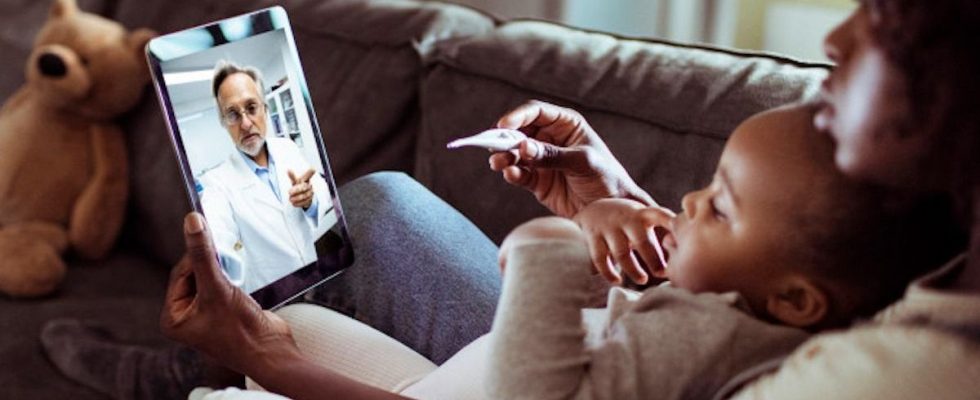Published on
Updated
Reading 3 mins.
Even if it is far from the peaks reached during the Covid, teleconsultation is now firmly established in the French medical landscape. But the take-off of platforms accessible seven days a week raises questions.
About one million teleconsultations are currently reimbursed each month, which represents 2 to 3% of total reimbursed consultations, according to figures from the Cnam (National Health Insurance Fund). A significant volume compared to the virtual non-existence before the Covid, but limited compared to the peaks reached during the pandemic: up to 4.5 million teleconsultations per month in April 2020, with new peaks at the time of returns from the virus, 2 million at the end of 2020 and 1.5 million at the start of 2022.
One in five consultations with an unknown doctor
A large part of these teleconsultations are carried out by doctors whom the patients already know – general practitioners or specialists carrying out regular follow-ups. But the Covid has also favored the take-off of platforms that offer online doctor appointments seven days a week, generally over extended hours. The patient obtains his appointment without delay or within a few hours, but with a doctor who may be located hundreds of kilometers from his home, and whom he will never see again.
At the giant Doctolib, which claims 500,000 teleconsultations per month today, 20% of teleconsultations are with patients that the practitioner does not know. According to a BVA survey published in June and carried out at the request of LET, the association of telemedicine companies, 22% of patients who have already teleconsulted have done so with a doctor they did not know in person.
“Aboveground”
The development of these “off-ground” consultations raises questions about professionals and public authorities. They want to avoid the drift towards an “uberized” medicine where the practitioner connects consultations on screen with patients he has never seen.
The government has tried to prohibit the reimbursement of work stoppages prescribed by teleconsultation (except by the attending physician). He did not win his case, censured by the Constitutional Council, but he promised to return to the charge. For its part, the Cnam monitors in particular the development of teleconsultation booths located in public places.
“I do not believe that there is a justified place for consultation gondolas in supermarkets, or in places that do not correspond to a normal exercise of care”, argued recently the Director General of Social Security, Thomas Fatôme. But the growing difficulties of access to doctors put wind in the sails of teleconsultation. “If we all had a choice, we all had a doctor and we could all knock on his door quickly, we would, but it’s not possible”, underlined Arthur Dauphin, of the UFC Que Choisir, in a colloquium organized in June by the LET. For him, “telemedicine has a role to play” to reconnect to the healthcare system for people who are far from it.
“Hybrid” medicine
For Qare, one of the major medical tele-appointment platforms, accessible seven days a week, teleconsultation is not intended to replace face-to-face consultation, but to be “complementary”, explains its general manager Olivier Thierry. “We want to facilitate access to care for everyone throughout the territory”, he indicates, specifying that “37% of patients” calling on Qare come from an area known to be under-medicalized (ZIP, priority intervention area).
Qare, which in 2021 became part of the British group HealthHero, is a heavyweight in the sector, and today claims 200,000 monthly teleconsultations in France. Other major teleconsultation appointment platforms include the Swedish Livi or the French Medadom or Maiia (Cegedim).
“We must not oppose telemedicine and face-to-face medicine”recently estimated Dr. Pierre Simon, founder and former president of the French telemedicine company, who foresees the arrival of a “hybrid” medicine, combining distance and face-to-face.
Scientific work around “telesemiology”, the study of symptoms and clinical signs from a distance, will make it possible to better distinguish “what falls under teleconsultation and what falls under face-to-face consultation”he indicated during the colloquium organized by the LET.
